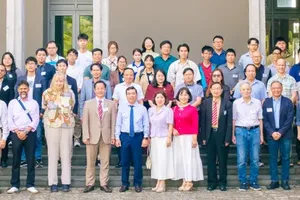
At last week’s scientific conference, “Digital Economy and TFP: the Foundation for Innovating Vietnam’s Economic Growth Model”, organized by the Central Policy and Strategy Commission and Vietnam National University, Ho Chi Minh City (VNU-HCM), numerous experts highlighted the formidable challenges in making Total Factor Productivity (TFP) a key driver for Vietnam to achieve its goal of becoming a high-income nation by 2045.
It was noted that since 2010, TFP’s contribution to Vietnam’s GDP growth has been quite low, clearly reflecting the country’s current state of modest labor productivity and an economy heavily reliant on capital. Therefore, various voices at the conference insisted on an urgent demand to transfer to a growth model based on productivity and efficiency. Meanwhile, the contribution of the digital economy to growth remains a subject of debate.
Assoc Prof Dr Vu Hai Quan, President of VNU-HCM, shared that the digital economy and TFP are the decisive factors for achieving high and sustainable long-term growth. Both in theory and in practice, the relationship between the digital economy and TFP is profoundly synergistic.
The digital economy – with the exponential development of technologies like artificial intelligence (AI), Big Data, cloud computing, and the Internet of Things (IoT) – is fundamentally reshaping the modes of production, distribution, consumption, and management.
This directly impacts and enhances TFP through multiple channels, such as by optimizing production and operational processes (for example, using AI and Big Data to refine supply chains or logistics). Simultaneously, it fosters innovation, drives labor structure shifts, and creates a workforce equipped with new knowledge and skills. Digital platforms also help reduce transaction costs, expand markets, and improve resource allocation.
Increasing TFP through the digital economy has become a strategic imperative because Vietnam is at a pivotal stage in transitioning its growth model. Traditional growth drivers like capital accumulation, low-cost labor, and natural resource exploitation are gradually becoming exhausted and are no longer suitable in the current global competitive landscape.
To escape the “middle-income trap” and realize the ambition of becoming a developed, high-income nation by 2045, it is essential to transition toward intensive growth, driven by the efficiency of technology and knowledge.
Despite immense potential, the development of Vietnam’s digital economy and the enhancement of TFP still face numerous barriers stemming from the current institutional framework, policies, digitally-skilled human resources, and the capacity to master foundational technologies.
Elaborating in more details on existing institutional challenges as well as potential solutions, Assoc Prof Dr Vu Hai Quan said that the rapid evolution of digital technology has created both a gap and a lag in the applicable legal framework.
Many emergent issues like AI, digital identity, and cross-border transactions have not been fully codified, leading to regulatory ambiguity and stifling innovation. Current tax, labor, and competition policies were designed for a traditional economy, creating friction when applied to the digital economy.
Therefore, one of the most immediate priorities is to complete the legal framework for data. The Data Law 2024 (effective July 1, 2025) is Vietnam’s first specialized law on digital data, but further review and amendment of related laws are necessary, as is the establishment of a “regulatory sandbox” for new digital technologies.
In parallel, it is necessary to design an effective national data governance model. A noteworthy proposal from experts in the conference is to establish a centralized data coordination model. This would involve strengthening the role of the National Data Center under the National Committee on Digital Transformation and forming a “National Data Council” to advise on and oversee our national data strategy.

Answering the inquiry whether the private sector’s role in building and sharing data should be further strengthened or not, Assoc Prof Dr Vu Hai Quan stated that the State should issue specific policies and incentive mechanisms to encourage businesses to participate in data sharing.
A mandatory sharing mechanism for common data among ministries and government agencies is also needed to transition from a culture of “data ownership” to one of “data sharing”, thereby overcoming the problem of “data silos”.
Many proposals at the conference on building an open data policy and developing a data market are worth considering. The Government could issue legal directives on open data, requiring ministries and localities to publish non-confidential datasets, and could pilot a state-managed data exchange to stimulate the data economy.
This must, of course, be accompanied by upgrading technical infrastructure, meaning investing heavily in large-scale, international-standard data centers and a government cloud computing system as well as developing training programs for data governance experts and promoting a national “data culture” and respect for personal data protection.
Finally, commenting on the role of universities in training human resources for the digital economy, Assoc Prof Dr Vu Hai Quan informed that universities must be granted greater autonomy to form joint ventures, competitively hire top talent, and manage assets with market mechanisms. This is crucial for strengthening the “Scientist-Entrepreneur-State” triple helix model, which is currently limited in Vietnam by restrictive policies and poor communication.
VNU-HCM will focus on overcoming these hurdles to foster deep collaboration with enterprises. The goal is to create breakthrough technologies and train a high-quality workforce that is tailored to specific industry needs.
























